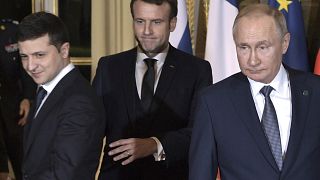Ukraine crisis: Macron and Putin agree to ‘intensify’ diplomacy, Kremlin says
Emmanuel Macron and Vladimir Putin have agreed to “intensify” diplomatic efforts to resolve the crisis over Ukraine, the Kremlin said on Sunday following a phone call between the two presidents.
The Elysée Palace, which said Macron subsequently spoke to Ukraine’s President Zelenskyy, had previously described the conversation with Putin as a last-minute diplomatic effort to try to avoid a Russian invasion of Ukraine.
It comes as tensions have reached their highest point in some years in eastern Ukraine, amid a spike of violence over the weekend that has reinforced fears in the West that Russia may seek a pretext to invade its neighbour.
The Russian and Belarusian armies were due to end joint military drills in Belarus on Sunday. However, Minsk has said the exercises will now continue because of the aggravated tensions in neighbouring Ukraine.
The drills began on February 10, adding to Western fears over Moscow’s intentions, despite Putin’s assurances that the exercises were “purely defensive”. Russia has massed an estimated 150,000 troops along the Ukrainian border but denies planning to invade.
Macron’s phone call with Putin began as scheduled at 11.00 CET and lasted for an hour and 45 minutes, the Elysée said. The French president’s office described it as among “the last possible and necessary efforts to avoid a major conflict in Ukraine”. It followed a meeting between the two leaders in Moscow on February 7.
According to the Kremlin, Putin blamed what he called Ukrainian “provocations” over the escalation in fighting with pro-Russian separatists in eastern Ukraine. He also demanded that NATO and the United States “take seriously” Moscow’s demands regarding security — the issue at the heart of the current crisis.
Russia wants guarantees that NATO will halt what it calls the alliance’s eastward expansion, rule out membership for Ukraine and other former Soviet countries, and roll back its military deployments in central and eastern Europe.
In other developments:
-
European Council President Charles Michel told the Munich Security Conference on Sunday that the West could no longer continue to offer an “olive branch” indefinitely when Russia was stoking tensions along the Ukrainian border. “One thing is certain: if there is further military aggression, we will react with massive sanctions,” he added.
-
Israel became the latest country to call on its citizens to leave Ukraine. Austria, France and Germany have also told their nationals to leave. German airline Lufthansa has cancelled flights to Kyiv and the Black Sea port of Odessa. NATO’s liaison office in Kyiv said it was relocating staff to Brussels and to Lviv in western Ukraine.
-
US President Joe Biden is to hold a rare meeting of the National Security Council on Sunday to deal with the Ukraine crisis, a few days before Secretary of State Antony Blinken is due to meet his Russian counterpart Sergei Lavrov.
-
UK Prime Minister Boris Johnson said on Saturday that Russia’s plan had “in some senses begun”, which could lead to “the biggest war in Europe since 1945”. He added that intelligence reports suggested Russian forces may look to invade Ukraine from the north as well as the east with the aim of encircling Kyiv.
Violence flares in eastern Ukraine
Hundreds of artillery shells have exploded this weekend along the contact line between Ukrainian soldiers and Russia-backed separatists in the conflict-ridden east, further increasing fears on Sunday that the volatile region could spark a Russian invasion.
It comes after international observers from the OSCE flagged more than 1,500 ceasefire violations on Thursday and Friday alone.
Separatist leaders in eastern Ukraine ordered a full military mobilisation on Saturday amid intensified violence in the war-torn region, while the evacuation of thousands of civilians into Russia has continued.
The Ukrainian army said two soldiers were killed and four injured on Saturday, the first fatalities in weeks, while mortar shells reportedly exploded near Ukraine’s interior minister as he visited the front line.
Ukraine’s foreign minister strongly denied that Ukrainian shells had landed in Russian territory, in response to reports in Russian media.
Western warnings echo in Munich
Western leaders on Saturday stepped up their warnings over the prospect of a Russian invasion of Ukraine, accusing Vladimir Putin of seeking to undermine European security and overhaul international order.
“Ukraine will continue to follow only the diplomatic path for the sake of a peaceful settlement,” Ukrainian President Volodymyr Zelenskyy told the Munich Security Conference. He told President Macron in a phone call on Saturday night that he would “not retaliate” to Russian “provocations” in the east of the country.
Zelenskyy, who has called for a meeting with Putin, used the conference to call for an end to all “politics of appeasement” towards Russia.
European Commission President Ursula von der Leyen said Russian access to financial markets and high-tech goods would be sharply limited under Western sanctions being prepared in case of a Russian attack.
“The Kremlin’s dangerous thinking, which comes straight out of a dark past, may cost Russia a prosperous future,” she said.
US Vice President Kamala Harris told the Munich conference on Saturday that the “foundation of European security is under direct threat in Ukraine”.
President Biden said on Friday he was now “convinced” that Putin had made the decision to invade, despite Moscow’s denials.
